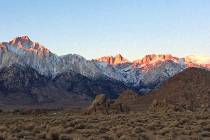Swiss bank disclosure may have some Las Vegans scrambling
If you think Swiss bank accounts are for billionaires and have no application to your life, you're probably like most people.
Known for their secrecy, for generations Swiss bank accounts and other offshore financial harbors have been used by the wealthy to shield their money from prying eyes. Most working stiffs need every nickel they earn just to pay the electricity bill and buy shoes for their kids.
But rich or poor, everyone is supposed to pay his taxes.
Thursday, Oct. 15, won't likely be remembered with the Tax Day trepidation of April 15, but it is the deadline for Americans who hold Swiss bank accounts to come forward and self-report the income they've been hiding. If they qualify for the IRS initiative, they'll be able to pay their back taxes, including penalties, and move forward without facing criminal charges.
If they fail to take advantage of the program, they'll face criminal prosecution. Criminal cases already have been prosecuted from Miami to Seattle.
Given the fact the names of 4,500 Americans have been obtained by the IRS from the United Bank of Switzerland, some of those account-holders are bound to be Las Vegas residents.
Not that Paul Camacho, special agent in charge of the Las Vegas IRS office, is acknowledging that.
In a carefully worded statement, Camacho said, "We've seen a dramatic increase in the number of voluntary disclosures since the initiative began. Individuals from every state in the nation have come forward and taken advantage of this program.
"I'm not at liberty to break down by state how many each has received. Interestingly, though, we have received voluntary disclosures from every continent with the exception of Antarctica. Maybe by the deadline we might receive one from there."
Perhaps a few Las Vegans will come in from the cold, too.
The IRS used a so-called "John Doe" summons to obtain information on possible tax fraud by people whose identities were unknown. Suffice to say John Doe was quite a hit at United Bank of Switzerland, which eventually turned over those 4,500 names.
The IRS gained enormous insight into the Swiss system in June 2008 when former UBS executive Bradley Birkenfeld pleaded guilty to conspiracy to defraud the government. Birkenfeld assisted many American UBS clients in avoiding U.S. reporting requirements by helping them create offshore shell companies that concealed the true ownership of their bank accounts.
Following his conviction, Birkenfeld swore UBS held upward of $20 billion in masked accounts for U.S. citizens.
These days, the masks are coming off.
Many UBS clients used the bank's credit accounts and debit cards, perhaps believing evidence of their transactions also would be concealed behind confidential walls in far-off Zurich. But those credit cards were processed in the United States, substantially through a company called First Data Corp. Records of expenditures thought to be secret are now within the reach of the IRS.
In other words, First Data has provided the last word on tracking the ebb and flow of money from offshore accounts into the country.
Tax regulations are complex, but in this area the law is simple: U.S. citizens must report all foreign financial accounts in excess of $10,000. Willfully failing to report can result in a felony conviction and a penalty of up to 50 percent of the amount in the foreign account.
"Offshore accounts harbor billions of dollars, and people should take notice that the secrecy surrounding these deals is rapidly fading," IRS Commissioner Doug Shulman said in 2008.
The Swiss government responded in May with a petition in federal court to prevent the forced disclosure by United Bank of Switzerland of 52,000 Americans suspected of hiding billions in untaxed assets. The Swiss asserted the IRS summons violated its "sovereignty and the international law," which is an intriguing argument on behalf of a bank suspected of facilitating billions in tax evasion and money laundering.
Back in Las Vegas, Camacho said, "I encourage anyone that this initiative may apply to to come forward before the deadline and take advantage of what the IRS is offering. Remember, those who do not come forward run the risk of criminal prosecution if it can be shown that they were engaged in willful tax evasion."
As members of a gambling culture, we should know when to hold 'em and when to fold 'em.
John L. Smith's column appears Sunday, Tuesday, Wednesday and Friday. E-mail him at Smith@reviewjournal.com or call (702) 383-0295. He also blogs at lvrj.com/blogs/smith.























